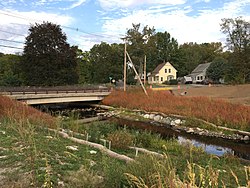
Caryville is a town in Washington County, Florida, United States located along the Choctawhatchee River. The Caryville is part of the Florida Panhandle in North Florida. The population was 301 at the 2020 census, down from 411 at the 2010 census. It is part of the Panama City—Panama City Beach, Florida Metropolitan Statistical Area.

Medway is a town in Norfolk County, Massachusetts, United States. The town had a population of 13,115 at the 2020 census.

Uxbridge is a town in Worcester County, Massachusetts, United States, first colonized in 1662 and incorporated in 1727. It was originally part of the town of Mendon, and named for the Earl of Uxbridge. The town is located 36 mi (58 km) southwest of Boston and 15 mi (24 km) south-southeast of Worcester, at the midpoint of the Blackstone Valley National Historic Park. The historical society notes that Uxbridge is the "Heart of The Blackstone Valley" and is also known as "the Cradle of the Industrial Revolution". Uxbridge was a prominent Textile center in the American Industrial Revolution. Two Quakers served as national leaders in the American anti-slavery movement. Uxbridge "weaves a tapestry of early America".

Cumberland is the northeasternmost town in Providence County, Rhode Island, United States, first settled in 1635 and incorporated in 1746. The population was 36,405 at the 2020 census, making it the seventh-largest municipality and the largest town in the state.
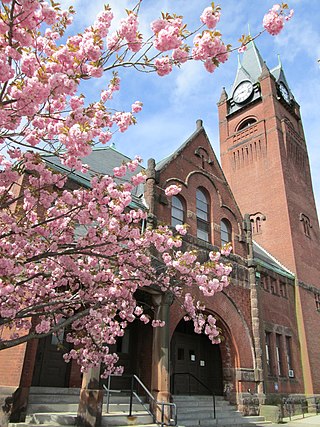
Ware is a town in Hampshire County, Massachusetts, United States. The population was 10,066 as of 2020. It is part of the Springfield, Massachusetts Metropolitan Statistical Area.

The Phelps and Gorham Purchase was the sale, in 1788, of a portion of a large tract of land in western New York State owned by the Seneca nation of the Iroquois Confederacy to a syndicate of land developers led by Oliver Phelps and Nathaniel Gorham. The larger tract of land is generally known as the "Genesee tract" and roughly encompasses all that portion of New York State west of Seneca Lake, consisting of about 6,000,000 acres (24,000 km2).

The history of Dedham, Massachusetts, 1635–1699, begins with the first settlers' arrival in 1635 and runs to the end of the 17th century. The settlers, who built their village on land the native people called Tiot, incorporated the plantation in 1636. They sought to build a community in which all would live out Christian love in their daily lives, and for a time did, but the Utopian impulse did not last. The system of government they devised was both "a peculiar oligarchy" and a "a most peculiar democracy." Most freemen could participate in Town Meeting, though they soon established a Board of Selectmen. Power and initiative ebbed and flowed between the two bodies.

Cove Lake State Park is a state park in Campbell County, Tennessee, in the southeastern United States. The park consists of 673 acres (2.72 km2) situated around Cove Lake, an impoundment of Cove Creek created by the completion of Caryville Dam in 1936. The park's location is in the town of Caryville and west of Jacksboro.

North Uxbridge is a village and a post office in the town (township) of Uxbridge in Worcester County, Massachusetts, United States. The postal zip code is 01538. It is classified as a community or populated place located at latitude 42.088 and longitude -71.641 and the elevation is 266 feet (81 m). North Uxbridge appears on the Uxbridge U.S. Geological Survey Map. Worcester County is in the Eastern time zone and observes DST. North Uxbridge is located approximately 36 miles west-southwest of Boston, and 15 miles southeast of Worcester. The town meeting in 1885 set aside North Uxbridge as a "special district", since its population had exceeded 1000 people. North Uxbridge appeared as a separate Census tract in the 1960 census, with a population of 1882. In 2013, an Uxbridge DIY show, The Garage, with Steve Butler, went worldwide from Steve's garage in North Uxbridge.
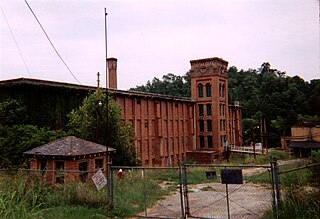
Newry is a census-designated place in Oconee County, South Carolina. According to the 2020 United States Census, the population of the CDP was 199.
The history of Uxbridge, Massachusetts, founded in 1727, may be divided into its prehistory, its colonial history and its modern industrial history. Uxbridge is located on the Massachusetts-Rhode Island state line, and became a center of the earliest industrialized region in the United States.
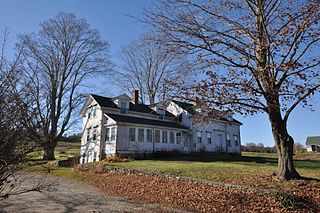
The Metcalf–Franklin Farm is an historic farm that has been in operation since 1801 and is located at 142 Abbott Run Valley Road in Cumberland, Rhode Island. It has been farmed by two family owners, the Metcalf family (1801-1857) and the Franklin family. It consists of a small complex of farm buildings on two parcels of land, located on either side of Abbott Run Valley Road and totaling over 65.35 acres (26.45 ha)

Bellingham is a town in Norfolk County, Massachusetts, United States. The population was 16,945 at the 2020 census. The town sits on the southwestern fringe of Metropolitan Boston, along the rapidly growing "outer belt" that is Interstate 495. It is formally a part of the Boston–Cambridge–Quincy metropolitan statistical area, as well as the Providence metropolitan area.
The Stillwater Mill was a former textile factory located in Smithfield, Rhode Island.

Conestee Mill is a historic mill in the unincorporated community of Conestee, in Greenville County, South Carolina.

The Millis Branch was a branch of what is now the MBTA Commuter Rail system. Branching off the still-operating Needham Line at Needham Junction, it ran through the towns of Dover, Medfield, Millis, and Medway. Due to lack of subsidies and poor ridership, the line was cut back to Millis station in April 1966, and all service ended on April 21, 1967, with the exception of some freight use on short portions of the line.
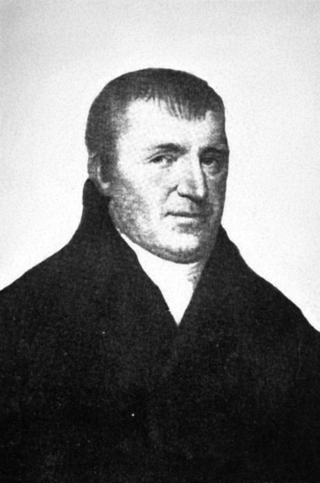
Jedediah Sanger was the founder of the town of New Hartford, New York, United States. He was a native of Sherborn, Massachusetts, and the ninth child of Richard and Deborah Sanger, a prominent colonial New England family. During the Revolutionary War he attained the rank of 1st Lieutenant having fought in the Battles of Lexington and Concord, the Battle of Bunker Hill, the Siege of Boston (1776), and during the New York Campaign.

George Clinton Ewing was a salesman, wainwright, land agent, superintendent, assessor, selectman, state representative, and most notably one of the chief founders of Holyoke, Massachusetts; he is credited as having first brought the idea of building a dam and industrial city at Hadley Falls to investors in Boston, New York, Hartford, and St. Johnsbury, Vermont in 1846.
Nathaniel Whiting was an early settler of Dedham, Massachusetts. He owned several mills on Mother Brook and is said to have dug the canal, the first man-made water way in America.

This is a timeline of the history of the town of Dedham, Massachusetts.
